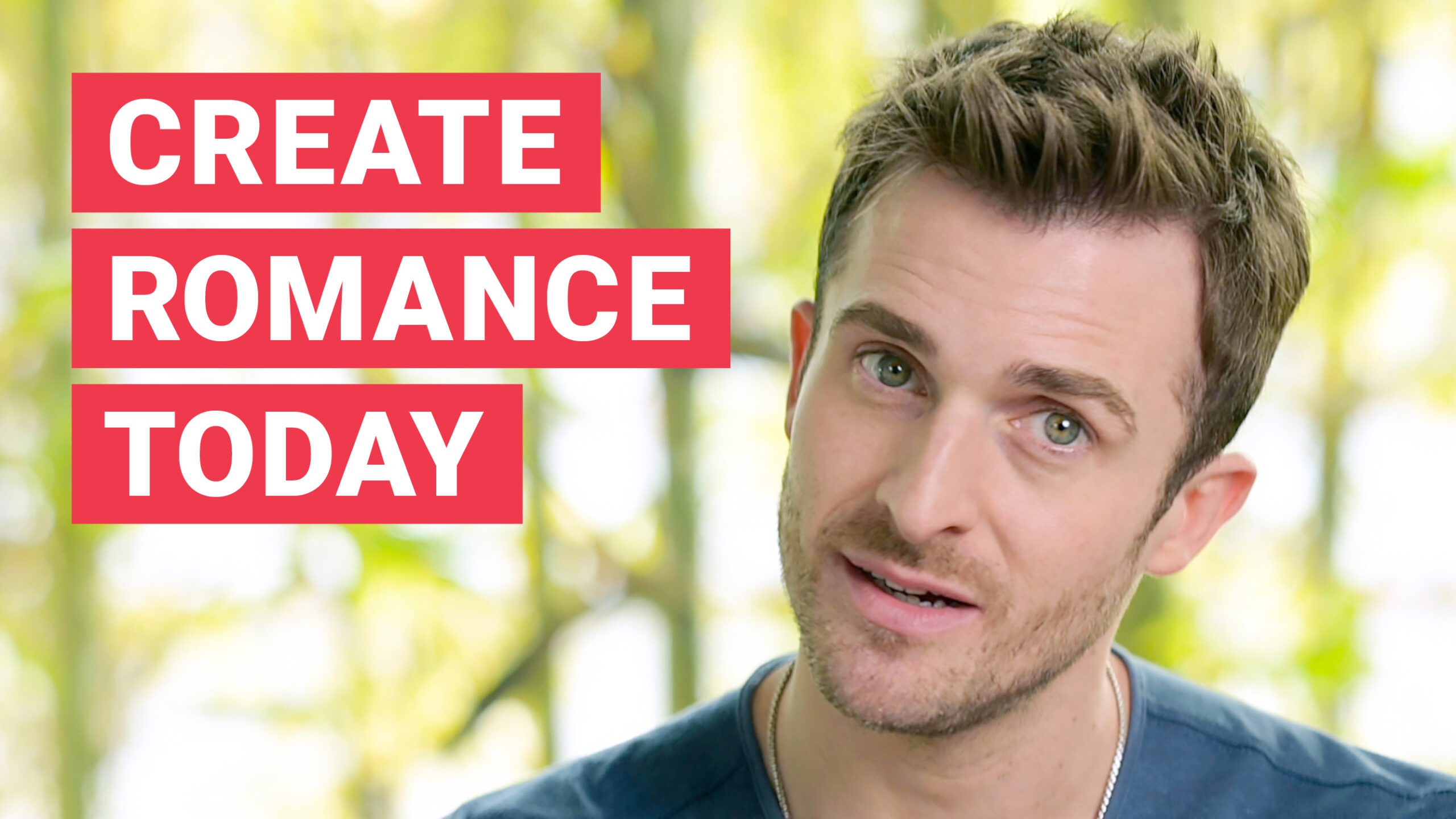According to a new UK-based study, “A third of people actually find their partner to be the most annoying person they know due to their infuriating habits.”
In this video, I dive into how you can use familiarity as a foundation on which to build passion and love. (And how together, you can work on habits that might frustrate the other person without the conversation itself eroding the relationship.)
Join Me on a Bigger Journey & Get Results in Your Love Life.
Try My VIP Coaching Experience for Free . . .
→ http://www.AskMH.com
Matthew:
I would go as far as to say, I don’t even think this is a stretch to say it has to be one of the causes of so many affairs, the desire to be impressive again. The desire to be seen in a new light, again. To be seen for the first time again.
*********************************************************************
Matthew:
This was an article in Men’s Health that talked about the fact that a third of people in relationships say their partner is the most annoying person they know. So a third of people in a relationship consider their other half to be the most annoying person they know because of their infuriating habits. The average loved up Brit spends up to a fifth of their day, each day, feeling frustrated with their significant other, because of snoring, passing wind . . .
Stephen:
Mm-hmm (affirmative).
Matthew:
Loudness, messiness, and rudeness. Equivalent to almost five hours of pure unbridled irritation per day.
Stephen:
Now, so you’re so if I . . .
Matthew:
I’m interested to hear this is Brits. I don’t know if the passing wind thing is a British or if that crosses borders, if they did it for Americans?
Stephen:
So they’re saying . . .
Matthew:
Maybe if it was Americans, it would be the number one most annoying thing.
Stephen:
They’re saying all of these . . . Well, that’s your experience of Americans. I don’t know what you are saying. But five hours they’re saying that adds up to of all those things. Not five hours of passing wind, just five hours of bad habits. But considering you’re asleep . . . You’re asleep for about eight hours. So five hours is a lot of your day.
Matthew:
That seems a bit . . . I suppose if you just assemble all the times . . . I don’t know.
Stephen:
That seems too much.
Matthew:
It does sound like a lot to me, Steve.
Stephen:
Like five hours . . .
Matthew:
It also lists other vexing traits as talking through TV shows.
Stephen:
Okay.
Matthew:
Bad with money, using their phone mid-conversation. That is an annoying one. Leaving clothes on the bedroom floor. That’s you Stephen.
Stephen:
Yup.
Matthew:
Leaving crumbs on the kitchen side. Also you.
Stephen:
Okay. Fair enough. What are you my partner? Are you having a go
Matthew:
Steve, in one form or another, I’ve been your partner since I was three years old or two, I suppose. I’ve dealt with your crumbs on the side.
Stephen:
And the final one says never listens. And that’s you. So if we’re going to start up on each other.
Matthew:
Well, sorry. I was happy to throw you under the bus on a couple of very easy going ones, clothes on the bedroom floor, which we all know is a fucking understatement when it comes to you. We’ve all seen your bedroom, mate.
Stephen:
Hey, we haven’t all seen it.
Matthew:
No. Well, and that’s a good thing for you, Steve. Because it might change a couple of opinions if people saw the bomb site that was your room. The cups in there, some old fucking tangerine peel from a bath in 2017.
Stephen:
Yeah, but you are talking about bachelor Steve. When I have a girlfriend, I’m like a drill sergeant. I’m cleaning that up before they all come over.
Matthew:
All right. So you won’t do it for the rest of us but you do it for your lady?
Stephen:
But for the woman I love, I’ll clean up those tangerine peels. You’re making me sound like a monster.
Matthew:
No, I’m not. My point was, I was throwing at you under the bus on kitchen crumbs and you said, I never listen. That’s a damning one.
Stephen:
And sometimes use your phone mid-conversation.
Matthew:
I thought that when I said it’s a bad one. I literally thought of myself.
Stephen:
But look, none of us are perfect.
Matthew:
Well, it’s been enlightening, hasn’t it? I’m glad we did this one. I’m glad we did this topic. Of those surveyed, 41 percent said they wouldn’t change their partners’ annoying habits because it’s what makes them them. I like the idea that they spend five hours a day of cumulative time being wound up by it, but they say I wouldn’t change it.
Stephen:
I just can’t imagine you, Ben, without your snoring and breaking wind. I can’t even picture life without it. It’s you.
Matthew:
Your gas is what makes you you.
Stephen:
I’ll tell you what, Gary, I wouldn’t change it for the world. But I can’t bloody stand it.
Matthew:
Well, I think that we all think we have it worse than we do. I’m not talking about genuinely abusive traits. We can take that off the table. I’m talking about these types of things that have been listed here. I think a lot of us . . . It’s not that we think we have it worse than we do. We think we have it so much worse relative to somebody else because familiarity breeds contempt. That is where that phrase comes from. It’s much easier to glorify what else is out there while you are with someone experiencing their long-standing habits that you get to see because you are comfortable together and you spend a lot of time together and then compare that to the superficial veneer of somebody else’s practiced good manners that come out day to day with strangers or with . . . You know, Steve, I bet . . . I’ve seen you. I’ve seen you with friends you see once every couple of months. You’re absolutely charming.
Stephen:
Right. Thank you very much.
Matthew:
You are. You are an absolute delight to be around when you see you every couple of months, but when you’re together with you every day, I’m not saying you’re not lovely, but it’s a different side of you.
Stephen:
Why is this all about having to go at me? I just . . .
Matthew:
It’s not. I’m using you as an example.
Stephen:
Okay. So I’m a difficult daily person to be around?
Matthew:
Well, I think I am too.
Stephen:
Right.
Matthew:
I think I’m quite difficult.
Stephen:
I’m pretty easygoing.
Matthew:
I think people would have no idea how difficult I can be.
Stephen:
Oh, they certainly don’t. No, they certainly don’t.
Matthew:
And so my point is that you don’t . . . You think you have it so bad with these things, but you know, trade them for another person you’re going to get another set of annoying habits.
Stephen:
Yeah. That’s why sometimes people probably think . . . They probably sometimes go back to their ex’s and they think, oh, God, what did I let go there, because this new person is a bloody nightmare.
Matthew:
Right. Right. Yeah.
Stephen:
And they probably start missing their ex because they think, God, I let go of a good thing there and I was complaining.
Matthew:
The tricky part as well is that some of the bad habits that rear their heads or the ones that bother us are part of a continuum that connects to sides of them we initially got attracted to.
Stephen:
Can you explain that?
Matthew:
Well, not to bring it back to you, Steve, but let’s take your mess.
Stephen:
No, go on. Yeah. Yeah. Leaving crumbs everywhere. Go on. Tell me why it’s a good thing, really.
Matthew:
Well, Steve, you are extremely bright.
Stephen:
Okay.
Matthew:
You are an intellectual. You are an academic.
Stephen:
Your words, not mine.
Matthew:
You are a doctor.
Stephen:
That is true.
Matthew:
And those things about you it’s like you have that sort of Sherlock Holmes creative genius thing about you where you just . . . You’re bookish, you lose yourself in thoughts and ideas, and you’re concerned with the big things in life. You are concerned with the big ideas, the philosophies, the systems that make things happen. And what that means is that your mind really . . . You don’t care about those clothes strewn across your bedroom floor. You don’t care. You are more interested in the book you’ve been reading that day. When you meet you and you go, God, this guy’s mind. This is a great mind. This is a mind that is doing some serious heavy lifting.
Stephen:
Again, your words.
Matthew:
This is a thinker. And then you get back to your bedroom and you go, what’s a fucking tangerine peel doing on the floor? They don’t . . .
Stephen:
But again, before a woman comes around, I clean that up.
Matthew:
Right. All I’m saying is you can actually draw a line between the two. Sometimes the spontaneity that we find exciting in someone is also responsible for the lack of presence we feel when we are with them or the fact that we can’t seem to pin them down for plans because there’s someone who likes doing things in the moment and they don’t like making plans. And initially you were attracted to that but now you’re actually finding it a bit frustrating. Sometimes the fact that you thought someone was incredibly charismatic in the early stages of dating comes back to bite you because you find out they continued to be very charismatic while you’re dating them and they give their attention quite freely in every direction. So now you feel like this person that had your attention because of their flirtatious nature or their charismatic nature now is the same person who makes you a bit jealous because that energy is something they continue to exude now that you have them.
Stephen:
Well, some things clearly, like you’re saying, it is an offshoot of their good qualities. So you either say, well, I really appreciate that and that’s not a person they’re ever going to be. But you could also say, well, there might be easy solves to some bad habits or bad things. If I just have a cleaner a few times a week, then the thing you are saying is a problem is gone, isn’t it? So it could be like, oh, well you could just solve that really quickly. If you just chill out a little bit extra for it you can mitigate some of your bad habits.
Matthew:
This goes for any relationship. This is not just romantic, for any . . . Many people live at home with siblings, parents, children. We’re often forced into close proximity with people whose habits frustrate us. There’s a couple of things we can do. First, look at . . . If I’ve known someone for a long time, it’s very easy for me to start focusing only on the things that bug me about that person and to completely take for granted the wonderful traits they have that you just have normalized.
Stephen:
Yeah.
Matthew:
And that other people would find amazing in that person, that other people would find incredible about your sister, your brother, your girlfriend, your boyfriend, your parents. What are the things they have that you no longer give them credit for? But that doesn’t mean that they don’t deserve credit. And the other thing is, we should understand what habits of mine don’t make me easy to live with but the person I’m with accepts. Because if we understand that that can actually breed some compassion towards their things. It often is a lack of self awareness that makes us so frustrated about things in other people. There’s a friend of mine who, in his thirties, was talking about how he kept ending relationships and starting new ones, and ending them and starting new ones. His mum once said to him, “When are you going to settle down? When are you going to find someone? And why do you always lose every person that you’re with? Why do you?” . . . And he says, mom, “I’m just looking for someone who’s got it. I don’t feel like I should settle. I want someone who’s got it all.”
Because he saw anything that was missing in a person as, well, that would be me settling if I went for that person. And his mum said to him, “I hate to be the one to break it to you, but you’re not perfect.” And that’s something we would all do well to remember at certain points when we’re thinking of . . . This is relevant for anyone who’s listening to this podcast right now who is in the stage of dating and they are looking for a partner, they’re doing the choosing. We often in a derogatory way, refer to being with someone who doesn’t have it all in your eyes as settling, right? And it’s quite a damaging term when you think about it. The idea of settling. Because it puts a very negative connotation on the idea that you would make your peace with being with someone who hasn’t got it all, as if anyone does.
*****************************************************************
Matthew:
Maybe you have specific love life questions for me about something you are going through right now. Well, there is a place where I answer them and that’s My Love.Life Club. This is for a group of people who have decided to be coached by me every month in a more intimate setting than YouTube. If you want to come be part of this, go to AskMH.com. The link is in the description for a 14-day free trial.
*****************************************************************
Matthew:
Instead of having the self-awareness to say, maybe I can come to terms with the fact that I don’t have it all, that there are things that are frustrating or annoying about me. There were things that someone will have to in some way, come to accept about me and therefore, I need to be able to do the same in the other direction. And that far from settling, that’s actually a form of accepting. To kind of maturing. It’s kind of growing up in the way that we see relationships.
Stephen:
Yeah.
Matthew:
Now, does that mean that within a relationship we shouldn’t find ways to mitigate some of our truly bad habits? No. There’s a difference between quirks and genuinely bad habits. I think we have to make a distinction there. It’s not being in a relationship with someone who never does the dishes isn’t charming.
Stephen:
No.
Matthew:
That’s not a, “Oh, that’s just them.” No, that’s a shitty teammate.
Stephen:
Yeah. And if they show zero effort of something that is of a need to you, that’s a problem.
Matthew:
Exactly. Yeah. And let’s be clear if you stress something that you need in order to feel appreciated, if you feel like what you have is someone who’s not being a team player in the responsibilities of a relationship or of a household or of a two people trying to survive together, trying to get through life together and build together and . . . It’s like a company, right? You’re running a company together. The two of you are running the company that is You Co., right? You and I in a relationship and that company, we want that company to thrive. Well, have I got a really bad partner in that company who doesn’t pull their weight? That’s a genuine problem, right? So we have to differentiate between quirks and genuinely poor habits. And we have to be able to bring up genuine poor habits to say, I need more, or I would appreciate if you helped more in this department, or if you didn’t do that as much. And we should look at ourselves and say, what could I do to mitigate some of my worst habits? That to me is part of growth in a relationship. If I do catch myself checking my phone, I have to be self-aware enough to say, actually, this isn’t a great behavior and if someone calls me out on this, rather than be defensive, I should be open to hearing why that’s not a pleasant thing for somebody else to experience.
Stephen:
Mm-hmm (affirmative).
Matthew:
We have to be open to that.
Stephen:
Yeah. Yeah. That initial reaction to criticism is so difficult to fight at first, as well, if you just leap too defensive. I’ve just found myself recently I’ve started just taking pauses with a criticism. And when I just get level headed . . . It’s like even asking for someone to go, oh, can you give me some constructive feedback on that thing I just did? Even if someone says something negative, you’re like, okay. I asked them to say that so let’s just pause a second and go, okay, that’s helpful. Good to know. There’s so much in that pause.
Matthew:
It’s the hardest thing to do. It’s where so much of our growth actually is. And I know there’s always a moment where I feel I’ve moved on sufficiently from a way that I was that it becomes easy and even enjoyable to talk about. You know how, in a sense when we are playing mentor to somebody else on something that we know at one point we had to change. It’s like if I take my doing videos five or 10 years ago, I’ll be able to find things in those videos that I did that I no longer do. They might be little ticks. They might be things that on reflection when I watch them, I’m like, oh, I don’t like when I say things like that, or I was doing that because I was insecure or whatever. And I’ve worked them out of my speech. I speak more effectively. Well, I can look back now and talk about those things because I have some distance from them because I’ve already improved them. And that’s when we tend to get comfortable talking about our flaws is once we’ve already improved them.
But if we can, instead, get comfortable experiencing them now, from the point of view of something we have to change, then we can actually do the work that gets us to the improvement quicker, is the denial of those things, the protracted denial that makes those things takes so long to fix in our lives. You just have to remember that the thing that you’re embarrassed to admit about yourself today will one day or can one day be the thing that you look back and help someone else learn on because you go, oh, I once did that and I no longer do that. That day can come so sooner if we are able to acknowledge those things now. And let’s be clear, in 10 years, if you take my speaking as an example, I plan to speak far more effectively in 10 years than I do today. I still look at the way I speak today.
And I use this as an example just because speaking is something I think a lot about because it’s probably one of the two or three most fundamental skills in what you and I do, Stephen, is the ability to speak well. But I can look at my speech even today and I’m constantly looking at it going, what are my bad speaking habits? What are the things . . . If I swear, if I curse . . . It’s not that I have some huge problem with cursing, but if I curse in a sentence where I go, that was just . . . It didn’t add anything. It was unnecessary. And come to think of it, I only said it because I actually didn’t have enough belief in that moment in the point I was making, making an impact. So then I swore in front of it because I felt like I needed somehow to grab people’s attention with it. In other words, that curse word in that moment was a reflection of the fact that I wasn’t trusting enough in the ability of the point to make itself without that.
Stephen:
Yeah.
Matthew:
Sometimes I use too many words. Afterwards I look at it and I go, wow, I need to learn to be more economical with my words. So I’m always looking at these things and I just think the more we can get comfortable looking at our bad habits and in real time start to make some of those changes, the more we’re just going to be amazing as a human being and the more we’re going to irreplaceable as a partner, because most people in love are not doing that.
Stephen:
Very true.
Jameson:
You know what this makes me think of Matt? I think some of the first advice I ever heard from you. I think somebody asked you, what’s your one best piece of relationship advice? And you said, never stop impressing your partner. And I’ve been married for almost three years. And I think there’s like a slight addendum to that, too, which is never stop being impressed by your partner. Never stop seeing those little things that they’re doing as they get to know you. When you’re doing all these things, you’re working with mastery as you become a better speaker. I think it would suck if I never noticed like . . . Because we’ve been working together for a long time. If I never noticed that you were getting better, be easy to just sit back and say like, okay, yeah, Matt’s always been a great speaker and you can start to take it for granted. Yeah. Man, you have been improving.
The same with my relationship with my wife. You need to be mindful about paying attention to those great things that person does for you and you have to hope that that person is also doing that for you as well and giving you credit.
Matthew:
And thank you for that Jameson. That’s really lovely. The credit thing is it matters because as you say, it’s not just for our benefit that we continue to recognize what’s great about our partners. It’s so that they can keep connecting to the reward of doing it, of being that thing more. If you think about the good habits we do, part of what drives us in our good habits is the reward. If I go to the gym, I feel good at the end of it. There’s a feeling that I want to get at the end of going to the gym, which is that little euphoric feeling of that release of I worked out it. If we write for an hour, we’re looking for that feeling of I wrote for an hour. I feel good. I did that difficult thing. We complete habits to get the reward at the end of it. Well, are we still giving our partner the reward from our side . . .
Stephen:
Yeah.
Matthew:
For doing those good habits? Do we still make them feel good for doing those things? And I think Jameson, you just hit on why relationships can deteriorate over time, or why they can become stagnant, or why over time it can feel like people are trying less. When I go on a date and I feel someone reflect back at me what’s impressive about me, that’s something that makes you go, oh, that felt good. You got a hit for being that thing.
Stephen:
Yeah. It’s that glow. And it’s same when someone gives you some interest or attention. Like if you have a friend who never asks you questions anymore about yourself, you start to notice, they don’t ever pay any attention to me anymore. They don’t ever notice the things I’m doing or care and that stuff registers with us over time. That’s what erodes a relationship.
Matthew:
Yup. Yup. I would go as far as to say . . . I don’t even think this is a stretch to say it has to be one of the causes of so many affairs is the desire to be impressive again. The desire to be seen in a new light again. To be seen for the first time again. To dazzle for the first time. And it’s why I say relationships are for heroes. Relationships are for heroes because one of the hardest things about a relationship is that it is hard to remain as exciting to your partner as the rest of the world is, because on one level you could argue, how do you compete? How do you continue to compete with the world of mystery when you become, over time, a completely known quantity? Taking the risk that someone is going to be with you and stay with you, despite the fact that you are becoming a completely known quantity to them and the rest of the world remains this my mysterious exciting thing, is a brave act. It’s a heroic act. It takes guts.
Because you know what doesn’t take guts? Living on the outside all the time. Living on the outside, dipping into someone’s life, being mysterious, being exciting and then disappearing. That doesn’t take guts. Because I, all I’m relying on for your interest is my mystery, my scarcity, my excitement. If you’re in a relationship and you have an affair with me that doesn’t take any guts by me, it’s easy to be exciting on the outside of a relationship and come in and make someone inside a relationship feel that you’re dazzling and exciting and amazing because you only have to be there for five minutes. Right? It’s like somebody else like . . . Steve, we have nephews, right? What happens with nephews and nieces? We go home. We get to play with the nephews and nieces for five minutes and they seem like the greatest thing ever. But if we’re with them for three hours, you start to go, okay, this is a lot. This is, this is a lot of work.
You see the mums and dads of kids, and you’re like, “Oh, my God, they’re so amazing. They’re so adorable.” And you love them because you’re with them for an hour and they’re like, “Try being here tonight. Try still being here next week. It’s tough. Right? It’s easy for my kids to come and make you think they’re the most exciting, charming thing in the world for five minutes.”
Stephen:
Yeah.
Matthew:
Right. That’s why parenting is heroic because you don’t leave. You stay and you stay through all of the difficult stuff. You stay through the bad habits. You stay through all of that realness. And I think the that’s one of the most beautiful things about a relationship is that you build something over time that is more exciting than mystery. You build something that is . . . It’s beautiful. You’re building beauty. In a way, you’re valuing beauty over mystery.
Stephen:
Yeah.
Matthew:
Right. And the more you add to it and the more you come to accept each other, and see each other, and bring out the best in each other, the more you’re building the beauty of the relationship and valuing that over the mystery. And I think that people pay a price in life in general. And I know in my past I’ve paid a price for it, for valuing mystery over true beauty.
Stephen:
Yeah.
Matthew:
You pay a price for that because you’re chasing a drug and you’re chasing a drug that can never live up to its promise. We all have to decide whether what we want is a real relationship or a perfect mystery.
******************************************************************
Matthew:
I really want you to watch this next video. I think it’s going to make a big difference in your life. Click the link here.
******************************************************************
Matthew:
And then we are looking every day for reassurance. Did you mean what you said yesterday? Are you really going to stay with me? Are you really never going to cheat on me? We can never get enough reassurance, and reassurance always needs to be topped up.













